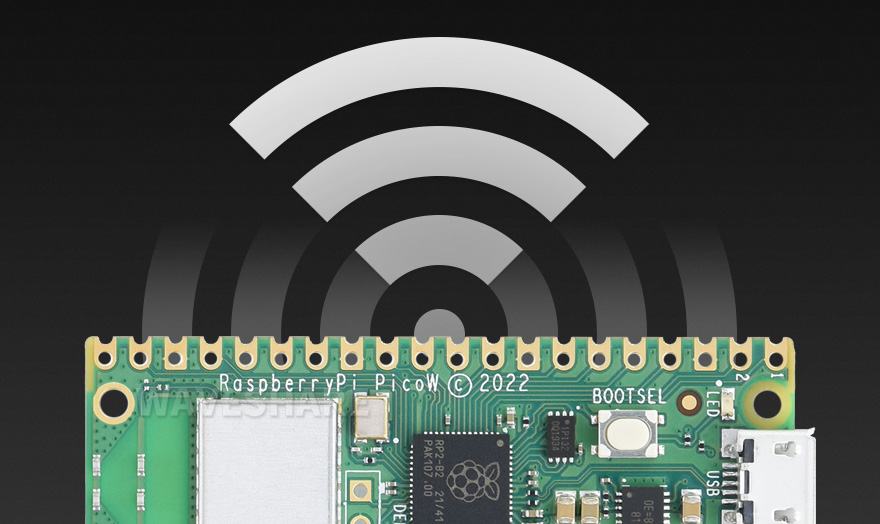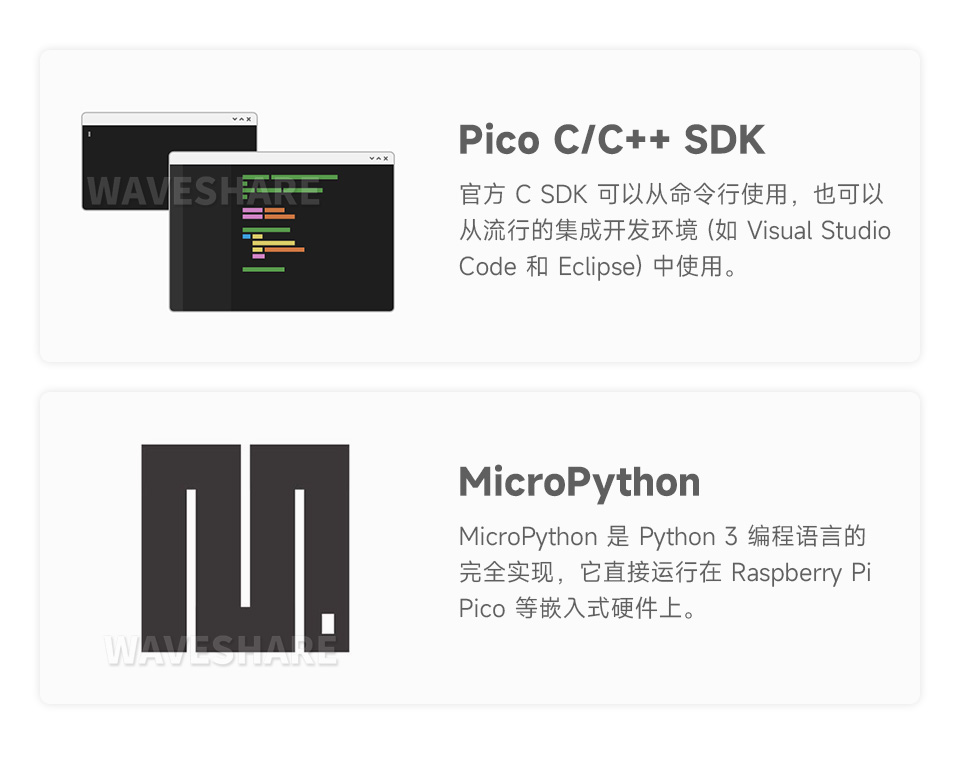產品說明24
2022新品 Raspberry Pi Pico W 高性能微控制器板 RP2040 開發板
Raspberry Pi Pico W 將 WiFi + BLE(即將推出)無線網路引入Pico平台,同時保持與的Pico引腳完全相容。


Raspberry Pi Pico W 是在 Raspberry Pi Pico 的基礎上,添加了無線通訊功能模塊,無線模塊硬件採用的是Infineon 的CYW43439 無線芯片,支持Wi-Fi 4 無線網絡,可使無線網絡控制和傳輸變得非常方便。

《影片》:
https://youtu.be/QIdyTlmdVW8

Raspberry Pi Pico W
Raspberry Pi Pico W adds on-board single-band 2.4GHz wireless interfaces (802.11n) using the Infineon CYW4343 while retaining the Pico form factor. The on-board 2.4GHz wireless interface has the following features:
Raspberry Pi Pico W使用英飛淩CYW4343增加了板載單頻段2.4GHz無線介面(802.11n),同時保留了Pico外形尺寸。板載 2.4GHz 無線介面具有以下特點:
- Wireless (802.11n), single-band (2.4 GHz) 單頻
- WPA3
- Soft access point supporting up to four clients/軟接入點支援多達四個用戶端
The antenna is an onboard antenna licensed from ABRACON (formerly ProAnt). The wireless interface is connected via SPI to the RP2040 microcontroller./該天線是從ABRACON(以前稱為ProAnt)授權的板載天線。無線介面通過SPI連接到RP2040微控制器。
Due to pin limitations, some of the wireless interface pins are shared. The CLK is shared with VSYS monitor, so only when there isn’t an SPI transaction in progress can VSYS be read via the ADC. The Infineon CYW43439 DIN/DOUT and IRQ all share one pin on the RP2040. Only when an SPI transaction isn’t in progress is it suitable to check for IRQs. The interface typically runs at 33MHz./由於引腳限制,某些無線介面引腳是共用的。CLK 與 VSYS 監視器共用,因此僅當沒有正在進行的 SPI 事務時,才能通過 ADC 讀取 VSYS。英飛淩CYW43439 DIN/DOUT和IRQ在RP2040上共用一個引腳。僅當 SPI 事務未在進行時,才適合檢查 IRQ。該介面通常以 33MHz 的頻率運行。
For best wireless performance, the antenna should be in free space. For instance, putting metal under or close by the antenna can reduce its performance both in terms of gain and bandwidth. Adding grounded metal to the sides of the antenna can improve the antenna’s bandwidth./為了獲得最佳無線性能,天線應位於可用空間中。例如,將金屬放在天線下方或附近會降低其在增益和頻寬方面的性能。在天線的側面添加接地金屬可以提高天線的頻寬。


【FEATURES/特色】
- RP2040 microcontroller chip designed by Raspberry Pi in the United Kingdom
- Dual-core ARM Cortex M0+ processor, flexible clock running up to 133 MHz
- 264kB of SRAM, and 2MB of on-board Flash memory
- Infineon CYW43439 Based Wireless Module
- Castellated module allows soldering direct to carrier boards
- USB 1.1 Host and Device support
- Low-power sleep and dormant modes
- Drag & drop programming using mass storage over USB
- 26 multi-function GPIO pins
- 2× SPI, 2× I2C, 2× UART, 3× 12-bit ADC, 16× controllable PWM channels
- Accurate clock and timer on-chip
- Temperature sensor
- Accelerated floating point libraries on-chip
- 8 × Programmable IO (PIO) state machines for custom peripheral support
Raspberry Pi Pico W brings WiFi + BLE (coming soon) wireless networking to the Pico platform while retaining complete pin compatibility with its older sibling.。/Raspberry Pi Pico W將WiFi + BLE(即將推出)無線網路引入Pico平台,同時保持與其老兄弟的引腳完全相容。


| 選購商品 |  | |  | |
產品附件
The Raspberry Pi Pico W builds upon the great cost-for-performance metrics of the Pico and add WiFi to the board. The Pico W features the same attributes as the Raspberry Pi Pico and also incorporates an Infineon CYW43439 wireless chip. CYW43439 supports IEEE 802.11 b/g/n wireless LAN, and Bluetooth® 5.2. (6/30/2022: Only Wireless LAN is supported on the Pico W at the moment, this will be updated as the new features become available)/Raspberry Pi Pico W建立在Pico出色的性價比指標之上,並在板上添加了WiFi。Pico W具有與Raspberry Pi Pico相同的屬性,並且還集成了英飛淩CYW43439無線晶片。CYW43439 支援 IEEE 802.11 b/g/n 無線域域網和藍牙 ® 5.2。(2022年6月30日:目前Pico W僅支援無線局域網,隨著新功能的推出,將進行更新)
The Raspberry Pi Pico line is a low-cost, high-performance microcontroller board with flexible digital interfaces. It feature the RP2040 which marks Raspberry Pi's first microcontroller designed in-house. Pico provides minimal (yet flexible) external circuitry to support the RP2040 chip (Flash, crystal, power supplies and decoupling and USB connector). The majority of the RP2040 microcontroller pins are brought to the user IO pins on the left and right edge of the board. Four RP2040 IO are used for internal functions - driving an LED, on-board Switched Mode Power Supply (SMPS) power control and sensing the system voltages./Raspberry Pi Pico系列是一款低成本、高性能的微控制器板,具有靈活的數位介面。它採用RP2040,這標誌著Raspberry Pi的第一個內部設計的微控制器。Pico 提供最少(但靈活)的外部電路來支援 RP2040 晶片(快閃記憶體、晶體、電源、去耦和 USB 連接器)。大多數RP2040微控制器引腳被帶到電路板左邊緣和右邊緣的使用者IO引腳。四個 RP2040 IO 用於內部功能 - 驅動 LED、板載開關模式電源 (SMPS) 電源控制和檢測系統電壓。
Pico uses an on-board buck-boost SMPS which is able to generate the required 3.3 volts (to power RP2040 and externalcircuitry) from a wide range of input voltages (~1.8 to 5.5V). This allows significant flexibility in powering the unit from various sources such as a single Lithium-Ion cell, or 3 AA cells in series. Battery chargers can also be very easily integrated with the Pico powerchain. Reprogramming the Pico's flash memory can be done using USB (simply drag and drop a file onto the Pico which appears as a mass storage device) or via the Serial Wire Debug (SWD) port. The SWD port can also be used to interactively debug coderunning on the RP2040./Pico 使用板載降壓-升壓 SMPS,能夠從寬輸入電壓範圍(~1.8 至 5.5V)產生所需的 3.3 V 電壓(為 RP2040 和外部電路供電)。這為從各種來源(例如單個鋰離子電池或3節AA電池串聯)為設備供電提供了極大的靈活性。電池充電器也可以非常容易地與 Pico 電源鏈集成。使用USB(只需將檔拖放到顯示為大容量存儲設備的Pico上)或通過串行線調試(SWD)埠即可對Pico的快閃記憶體進行重新程式設計。SWD 埠還可用於以交互方式調試 RP2040 上的代碼運行
Pico has been designed to use either soldered 0.1" pin-headers (it is one 0.1" pitch wider than a standard 40-pin DIP package) or can be used as a surface mountable "module", as the user IO pins are also castellated. There are SMT pads underneath the USB connector and BOOTSEL button, which allow these signals to be accessed if used as a reflow-soldered SMT module./Pico 設計為使用焊接的 0.1“ 引腳針座(比標準 40 引腳 DIP 封裝寬 0.1” 間距),或者可用作表面貼裝“模組”,因為使用者 IO 引腳也是分層的。USB連接器和BOOTSEL按鈕下方有SMT焊盤,如果用作回流焊SMT模組,則可以訪問這些信號。
相關文件


資料路徑:www.waveshare.net/wiki/Raspberry_Pi_Pico_W

支持C/C++,MicroPython
配套完善的SDK、開源資料教程,方便上手,可快速嵌入到應用中


Raspberry Pi Pico W Datasheet An RP2040-based microcontroller board with wireless
Connecting to the Internet with Raspberry Pi Pico W Getting Raspberry Pi Pico W online with C/C++ or MicroPython

Resources and more! 更多資源
- Click here to get started with your Pico!
- RP2040 Datasheet:
https://datasheets.raspberrypi.org/rp2040/rp2040_datasheet.pdf - Hardware Design with RP2040:
https://datasheets.raspberrypi.org/rp2040/hardware_design_with_rp2040.pdf - Raspberry Pi Pico Datasheet:
https://datasheets.raspberrypi.org/pico/pico_datasheet.pdf - Getting Started with Raspberry Pi Pico:
https://datasheets.raspberrypi.org/pico/getting_started_with_pico.pdf - Pico C/C++ SDK:
https://datasheets.raspberrypi.org/pico/sdk/pico_c_sdk.pdf - Pico Python SDK:
https://datasheets.raspberrypi.org/pico/sdk/pico_python_sdk.pdf

《Raspberry Pi Pico and RP2040 FAQ》
- Should I buy a Raspberry Pi Pico or a Raspberry Pi Zero?
我應該購買Raspberry Pi Pico還是Raspberry Pi Zero?
These are two very different devices, a microcontroller and a microcomputer, intended for different purposes. Pico is a great device for dedicating to a very specific task, whereas Zero is a multipurpose device. Raspberry Pi Zero has HDMI out, a camera interface, etc; Raspberry Pi Pico does not. However, Pico has an on-board ADC as well as other peripherals not present on Raspberry Pi Zero, and consumes considerably less power; it is therefore much more suited to embedded applications than Raspberry Pi Zero.
這是兩個非常不同的設備,分別用於不同目的的微控制器和微型計算機。Pico是用於完成特定任務的出色設備,而Zero是多功能設備。Raspberry Pi Zero具有HDMI輸出,攝像頭接口等;Raspberry Pi Pico沒有。但是,Pico具有板載ADC以及Raspberry Pi Zero上不存在的其他外設,並且功耗大大降低。因此,它比Raspberry Pi Zero更適合嵌入式應用程序。
- What OS does it run?
它運行什麼操作系統?
Like other microcontrollers, it doesn't run an OS by default, but we supply a SDK which provides a rich library of functions for using the hardware/features of the chip, along with higher-level functionality often found in an OS. You can use this to write “bare metal” C/C++ applications easily, or you can use MicroPython, which is even simpler for beginners.
與其他微控制器一樣,它默認情況下也不會運行OS,但是我們提供了一個SDK,該SDK提供了豐富的功能庫,可用於使用芯片的硬件/功能,以及OS中常見的高級功能。您可以使用它輕鬆地編寫“裸機” C / C ++應用程序,也可以使用MicroPython,對於初學者來說,這甚至更加簡單。
- Can I buy the RP2040 chip?
我可以購買RP2040芯片嗎?
Not yet, but they will be on general sale in the near future. Watch out for the announcement! 尚未,但是它們將在不久的將來全面發售。注意公告!
- Is it open-source?
它是開源的嗎?
The Raspberry Pi Pico board design files are open-source, along with all the provided software, examples, and documentation. The internal design of the RP2040 microcontroller itself is not open-source.
Raspberry Pi Pico電路板設計文件以及所有提供的軟件,示例和文檔都是開源的。RP2040微控制器本身的內部設計不是開源的。
- Does it support Arduino/Blockly/other programming environments?
它是否支持Arduino / Blockly /其他編程環境?
No, but we do expect third parties to port their own development systems to RP2040/Pico over time. For launch, alongside the very comprehensive C/C++ SDK, there is an official port of MicroPython. Adafruit has also ported CircuitPython to RP2040.
不會,但是我們希望第三方能夠隨著時間的推移將其自己的開發系統移植到RP2040 / Pico。對於發布,除了非常全面的C / C ++ SDK外,還有MicroPython的官方端口。Adafruit還已將CircuitPython移植到RP2040。
- Is RP2040 5V tolerant? RP2040 5V耐壓嗎?
No. RP2040 microcontrollers use 3.3V for GPIO.
否。RP2040微控制器將3.3V用於GPIO。
- I've accidentally connected +5V to my Raspberry Pi Pico or other RP2040-based microcontroller. Is the pin dead?
我不小心將+ 5V連接到我的Raspberry Pi Pico或其他基於RP2040的微控制器。銷釘死了嗎?
It depends; often RP2040 will survive, but it is not recommended, and can reduce the life of the microcontroller.
這取決於; 通常RP2040可以存活,但是不建議這樣做,它會縮短微控制器的壽命。
- What is the maximum flash size for the RP2040 chip?
RP2040芯片的最大閃存大小是多少?
16 MiB of flash (2^24 bytes).
- Can I overclock it?
我可以超頻嗎?
The maximum clk_sys clock speed is 133MHz at normal core voltage (1.1V ±10%), but it can be overclocked. However, this requires more power and a higher core voltage, and may affect the life expectancy of your device. No warranties are given when running outside of the limits specified in the datasheet.
在正常核心電壓(1.1V±10%)下,最大clk_sys時鐘速度為133MHz,但可以超頻。但是,這需要更多的功率和更高的核心電壓,並且可能會影響設備的預期壽命。如果超出數據手冊中指定的限制,則不提供任何擔保。
- What low-power modes are there?
有哪些低功耗模式?
There is no specific low-power mode, but you can do various things to reduce power consumption: slow the system clock, power down some of the memories, gate the clock to peripherals, reduce the core supply voltage, etc.
沒有特定的低功耗模式,但是您可以採取各種措施來降低功耗:降低系統時鐘速度,關閉某些存儲器的電源,將時鐘控製到外設,降低內核電源電壓等。
There are two specific modes for turning off parts of the device when not being used:
SLEEP mode is when processors are in wfi/wfe and DMA is inactive, so you can shut off most system clocks, including things like bus fabric.
幾種模式:睡眠模式是指處理器處於wfi / wfe狀態且DMA不活動時,因此您可以關閉大多數係統時鐘,包括總線結構之類的東西。
DORMANT mode is when you shut down all oscillators, and so is lower power still, but then you have fewer options for waking.
當您關閉所有振盪器時,將進入休眠模式,此時仍然需要較低的功耗,但是喚醒的選項卻更少了
- I’m using VSCode. How do I set a breakpoint on the second core?
我正在使用VSCode。如何在第二個內核上設置斷點?
At the moment you need to use the command window in VSCode to set a gdb breakpoint. 目前,您需要使用VSCode中的命令窗口來設置gdb斷點。
- GCC 10.2 is available. Why aren’t you using it by default?
提供了GCC 10.2。您為什麼默認不使用它?
Our development work has been using the more common versions of GCC as supplied with various distributions. We have checked builds using major gcc versions from 6.3.1 to 10.2, so all of those should work.
我們的開發工作一直在使用隨各種發行版提供的GCC的更通用版本。我們已經檢查了使用6.3.1到10.2的主要gcc版本進行的構建,因此所有這些版本均應正常工作。
- What is the maximum source impedance required for the ADC inputs to achieve the 9-bit resolution?
ADC輸入達到9位分辨率所需的最大源阻抗是多少?
We are currently working on characterising this, and will update the datasheet.
我們目前正在對此進行表徵,並將更新數據表。
